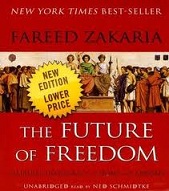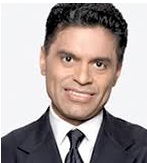 |
- Hosts CNN’s flagship foreign affairs show
- A Washington Post columnist
- A New York Times bestselling Esquire Magazine
- An Editor-at-Large of TIME Magazine
----------------------------------------------------------------------------------------
----------------------------------------------------------------------------------------
Fareed Zakaria, one of our most perceptive analysts of America's role in the world
NRIs generally agree with him
Los Angeles, March 12, 2011
Gary Singh/Surinder Mehta
Person of the year 2008 by India Abroad, Padma Bhushan" award by the Indian Government, Editor-at-Large of TIME Magazine, the top 100 global thinkers, nominated for an Emmy for "Outstanding Interview with Chinese Premier " and “the most influential foreign policy adviser of his generation.” by Esquire Magazine--- Mumbay born Mr. Fareed Zakaria said:
- "I am an American, not by accident of birth but by choice. I voted with my feet and became an American because I love this country and think it is exceptional. But when I look at the world today and the strong winds of technological change and global competition, it makes me nervous."
Dr. Zakaria’s in-depth interviews with the Dalai Lama, heads of state including Barack Obama, Manmohan Singh, King Abdullah II, Dmitry Medvedev, Moammar Gadhafi and Lula da Silva, as well as countless intellectuals, business leaders, politicians and journalists have been broadcast in more than 200 million homes in over 210 countries. Within its first year, GPS garnered an Emmy nomination for an interview with Premier Wen Jaibao.
Mr. Fareed Zakaria said:, he tries not to be devoted to any type of ideology.
- I feel that's part of my job- which is not to pick sides but to explain what I think is happening on the ground.
- I can't say, 'This is my team and I'm going to root for them no matter what they do.'"
After the 9/11 attacks, in a now-legendary Newsweek cover essay, "Why They Hate Us," Zakaria argued that Islamic extremism was not fundamentally rooted in Islam, nor could it be claimed a reaction to American foreign policy. It had its roots in the stagnation and dysfunctions of the Arab world. Decades of failure under tyrannical regimes, all claiming to be Western-style secular modernizers, had produced an opposition that was anti-Western, religious, violent, and increasingly globalized. Since the mosque was a place where people could gather and Islam an institution that was outside the reach of censorship, they both provided a context for the growth of the political opposition. Zakaria argued for an inter-generational effort to create more open and dynamic societies in Arab countries, and thereby helping Islam enter the modern world.
His cover stories and columns—on subjects from globalization and emerging markets to the Middle East and America’s role in the world—reach more than 25 million readers weekly. Before joining Newsweek in October 2000, he spent eight years as managing editor of Foreign Affairs, a post he was appointed to at only 28 years old.
Invasion of Iraq, 2003:
- He supported the invasion of Iraq. He said: The place is so dysfunctional--- any stirring of the pot is good. America’s involvement in the region is for the good. He criticised for a United Nations-sanctioned operation with a much larger force of 400,000 troops
- Later he criticized Bush administration, the way was running the occupation of Iraq- the costs of the invasion and occupation have been much higher than the benefits.
- In March 2007, he opposed the Iraq surge- it would work militarily but not politically, still leaving Iraq divided among its three communities- the Sunni Arabs, Shia Arabs, and Kurds, and begin a reduction in forces to only 60,000 troops
- In 2009, he stated flatly that the surge "succeeded," militarily and did better politically than he would have predicted.
Awards
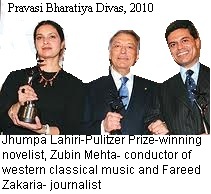
- 2010 "Padma Bhushan" award by the Indian Government for his contribution to the field of journalism
- In 2010, Foreign Policy makers, named him one of the top 100 global thinkers.
- In October 2010, he was named Editor-at-Large of TIME Magazine . TIME is the world's largest weekly newsmagazine with a domestic audience of 20 million, and four worldwide editions with a combined global audience of 24 million.
- Received honorary degrees by at the University of Miami and Brown University.
- Person of the Year 2008 by India Abroad
- In 1999, described by Esquire Magazine as “the most influential foreign policy adviser of his generation.”
- In 2005, he was awarded the Hubert H. Humphrey First Amendment Freedoms Prize by the Anti-Defamation League
- His October 2001 Newsweek cover story, “Why They Hate U,” remains the most decorated.
- Zakaria's interview with Chinese Premier Wen Jiabao was nominated for an Emmy for "Outstanding Interview".
---------------------------------------------
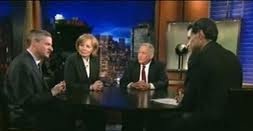 - -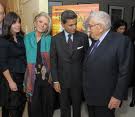
- Hosts CNN’s The "GPS": This show stands for "Global Public Square," a reference to the show's focus on international issues and foreign affairs. Each week it brings in-depth interviews with world leaders, newsmakers, and analysts breaking down the world's toughest problems. The show airs every Sunday at 10am and 1pm EST on CNN.
- a Washington Post columnist
- a New York Times bestselling Esquire Magazine
- Editor-at-Large of TIME Magazine--Fareed Zakaria was named Editor-at-Large of TIME Magazine in October 2010. TIME is the world's largest weekly newsmagazine with a domestic audience of 20 million, and four worldwide editions with a combined global audience of 24 million.
- In the Middle East protests, a seismic shift---------------------February 24, 2011
- Why There's No Turning Back in the Middle East-------------February 17, 2011
- Egypt's real parallel to Iran's revolution------------------------February 7, 2011
- How Democracy Can Work in the Middle East---------------February 3, 2011
- How Russia Created Its Own Islamic Terrorism Problem------January 27, 2011
- Can Obama get it right on the economy?----------------------January 24, 2011
- The Dangerous Chip on China's Shoulder---------------------January 12, 2011
- Can Pakistan rid itself of religious fanaticism?------------------January 10, 2011
- Why 2011 Will Be a Happier New Year----------------------December 28, 2010
- The Year of Microterrorism-----------------------------------December 15, 2010
- "The number and pace of attempted attacks against the United States over the past...
Author:
- Written two books: The Future of Freedom, and the Post-American World.
- He also wrote that a "moderate, mainstream version of Islam" is essential to winning the war on terror.
- After the attacks of Sept. 11, Mr. Zakaria published an influential essay titled “Why They Hate Us.”
- The Post-American World was heralded in the New York Times book review as "...a relentlessly intelligent book" and The Economist called it “…a powerful guide” to facing global challenges. Like The Post-American World, his previous book, The Future of Freedom, was a New York Times bestseller and has been translated into over 20 languages.
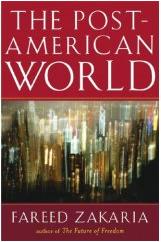
Now available in paperback with an all-new preface.
In New York Times bestseller, The Post-American World, Fareed Zakaria argues that the "rise of the rest" is the great story of our time.
"This is not a book about the decline of America, but rather about the rise of everyone else." So begins Fareed Zakaria's important new work on the era we are now entering. Following on the success of his best-selling The Future of Freedom, Zakaria describes with equal prescience a world in which the United States will no longer dominate the global economy, orchestrate geopolitics, or overwhelm cultures. He sees the "rise of the rest"—the growth of countries like China, India, Brazil, Russia, and many others—as the great story of our time, and one that will reshape the world. The tallest buildings, biggest dams, largest-selling movies, and most advanced cell phones are all being built outside the United States. This economic growth is producing political confidence, national pride, and potentially international problems. How should the United States understand and thrive in this rapidly changing international climate? What does it mean to live in a truly global era? Zakaria answers these questions with his customary lucidity, insight, and imagination.
"With elegance and insight, Fareed Zakaria sets forth for our times a fundamental truth previously articulated by Aristotle and Tocqueville: unregulated democracy undermines liberty and the rule of law. The Future of Freedom is one of the most important books on global political trends to appear in the past decade. Its sobering analysis has vital lessons for all of us concerned with freedom's future in the world." –Samuel Huntington
"Fareed Zakaria covers an immense amount of ground in this eloquent examination of the varieties of freedom and democracy. Mastering the nuances of every corner of the world, discussing the critical (and virtually unexamined) problem of "illiberal democracy," analyzing what he correctly calls "the Great Exception" of Islam, Zakaria forces us to think in new ways about values that Americans take for granted." –Ambassador Richard Holbrooke
"Fareed Zakaria’s The Future of Freedom is a learned, tough minded, and intellectually courageous warning that easy bromides about democracy, if taken as a literal guide to policy, could make the world a more dangerous and less pleasant place. At a moment when Washington is full of hopeful talk about bringing democracy to the Middle East, Zakaria’s book should start a sorely needed discussion about how to balance the hope of bringing more freedom to the region with the risk of further empowering radical Islam." –Nicholas Lemann
"At once fascinating and illuminating." –Bernard Lewis
"In this incisive book, Fareed Zakaria asks searching questions and offers provocative answers. The Future of Freedom is an impressive contribution to our understanding of the crises of democracy that lie darkly ahead." –Arthur Schlesinger
"This is a very thoughtful and intelligent book which is important for all Americans and those who would make American policy. After all, what is more important than the real meaning of freedom and democracy? The book could not appear at a more appropriate time." –Peter Jennings
-----------------------------------------
CNN
Feb. 20, 2011:
An exclusive interview with billionaire banker and activist George Soros. The man who has given billions of dollars of his own money to support democracy and open societies around the world offers his take on the events sweeping across the Middle East and North Africa, and makes a bet that the Iranian regime will fall within a year. Soros, a big backer of Obama's presidential campaign, offers his opinion of how his candidate has fared in office. The answer might surprise you. And just what about those accusations by Glenn Beck, saying Soros is the "puppet master" trying to overthrown the American way of life? Soros fires back
Feb. 13, 2011:
A live special edition with the latest from the revolution in Egypt. The scenes from Tahrir Square and elsewhere around Egypt have captivated the world. The sense of joy and elation is breathtaking.
Jan 30, 2011
First it was Tunisia. Now chaos rules in Cairo. The ruling party's headquarters are ablaze. Casualties are mounting. The Army has rolled into the capital. President Mubarak has sacked the government and the people of Egypt have taken to the streets demanding his ousting.
xxxxxxxxxxxxxxxxxxxxxxxxxxxxxxxxxxxxxxxxxxxxx
BIO:
Fareed Zakaria was born in Bombay on January 20, 1964 to a Konkani Muslim family. He is a naturalized American citizen.. He is married to Paula Throckmorton Zakaria. Paula receiver MBA from Harvard school and owns a jewelry-design business. They have a son, Omar, and a daughter, Lila and family live in a 3,900-square-foot townhouse on West 102nd Street. Mr. Zakaria paid $3.4 million for this townhouse in 2004. His father was a politician, member of Indian National Congress and an Islamic scholar. Fatima Zakaria, his mother was editor of the Sunday Times of India.
- Mr. Zakaria attended The Cathedral and John Connon School in Mumbai.
- He received a B.A. degree from Yale University, New Haven, Connecticut.
- Became President of the Yale Political Union, editor-in-chief of the Yale Political Monthly.
- Became Memember of the Scroll and Key society and the Party of the Right (Yale).
- Received a Ph.D. degree in Political Science from Harvard University in 1993
- In 2000, he was named editor of Newsweek International
- In 2007, Foreign Policy and Prospect magazines named him one of the 100 leading public intellectuals in the world
- In 2010, he worked as contributing editor and columnist for Time magazine
- Wrote for the New York Times, the Wall Street Journal, The New Yorker, and as a wine columnist for the webzine Slate.
- Co-edited The American Encounter- The United States and the Making of the Modern World
- 2002–2007: analyst with ABC's This Week with George Stephanopoulos
- 2005–2008: hosted the weekly TV news show, Foreign Exchange with Fareed Zakaria on PBS
- June 2008: weekly show, Fareed Zakaria GPS ("Global Public Square") premiered on CNN- airs at 10:00am and 1:00pm on Sundays
- 2008: he supported Barack Obama at Democratic primary campaign and later for president election
- In 2009 Forbes referred to Zakaria as one of the 25 most influential liberals in the American media

|


 -
-
